#if i wasn't traumatized. maybe a little bit of 'if i was pretty & cis/straight' too like let's be real
Explore tagged Tumblr posts
Text
massively accomplished friend from grad school is adding another accomplishment to her very very busy & full life, i am beyond happy for her (she's a wonderful person!) but i also just have to keep whispering to myself "some people are not disabled"
#or they are less disabled. or disabled in very different ways#to be clear i am proud of my own accomplishments & grateful for my privileges & very fucking aware of what i AM able to do#but oh my god. there are a lot of things i wanted or even planned for my life#so many fucking things i would love to do#if i had the energy/stamina/executive function/lack of pain#if i wasn't traumatized. maybe a little bit of 'if i was pretty & cis/straight' too like let's be real#in the field we both studied & worked in it makes kind of a big difference
10 notes
·
View notes
Text
Fixing "Boy Erased" (2018)
I recently decided to watch Boy Erased (2018) again, now that we're a couple years out from its initial release (and hype). And I came away with some thoughts.
First, something I think worked. You know that scene near the end, when Jared (Lucas Hedges) is trying to leave the conversion camp and he's racing through corridors and whatnot. That whole sequence works, but there's one moment that really stands out.
Jared attempts to get his phone and Michael (one of the 'camp counselors') tries to physically wrestle it away from him. There's a bit of a fight but eventually Jared makes his way to the bathroom and he calls his mom to come take him away. He then emerges from the bathroom and says to Victor Sykes (who runs the camp), "If you, or anyone else puts their hands on me, I have witnesses." Victor puts up his hands and says, "Nobody's gonna put their hands on you. Why would anybody do that? Come and sit. We're gonna wait for your mom, okay?" Then there's a hard cut to this:
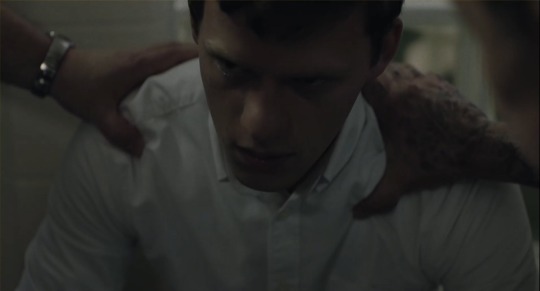
Victor Sykes and Brandon literally laying their hands on Jared and praying. And I love that juxtaposition because it brings to light the violence inherent in this situation. They're restraining him through enforced religious acts. There's violence in this prayer.
And on top of that, it serves as a pretty good metaphor for the whole film. Jared's parents (especially his mother) believe they're helping but really they're hurting. They can't see the violence of their actions in sending him to the camp.
If only the rest of the film was working on this level.
Problem the first: Audience as observer. The film is really about observing its subject, Jared, as he experiences these events. But it isn't about giving us any insight into his perspective or interiority as he does so. The camera is looking at Jared more often that it is revealing to us what he's seeing. Perhaps the most obvious example of this issue is with the perfume ad scene. Jared is on a run and he comes across a perfume ad on the side of a bus stop with a bare chested buff guy. The camera shows us the ad, and then the rest of the scene has the camera (and thus, the audience) placed some distance away as we see Jared first touch the ad, then throw a rock at the ad, and then scream "fuck you" at it repeatedly. The ad itself isn't salacious enough to illicit that kind of response in the average audience-goer, and the camera is so disconnected from Jared's experience that we aren't really gaining insight into why this ad is affecting him in such a strong way. It ends up making it so that scene really does not work.
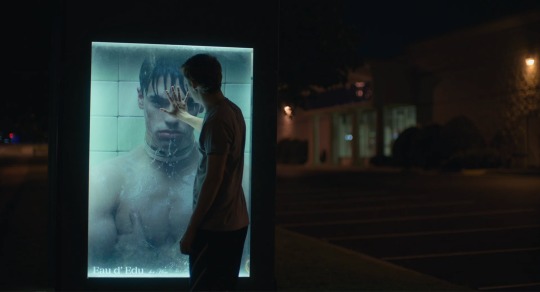
This isn't to critique Lucas Hedges's performance in that scene. It's more to say that all the other elements of that scene make it feel ridiculous - because the audience has not been guided toward viewing that ad in the same way that Jared does in that moment.
The second problem: Casting. To be absolutely clear, this is not a knock against any of the actors performances. On the contrary, I think everyone was pretty dang exceptional. Rather, it's more a conversation about casting choices. Two of those choices really stand out as somewhat misguided: Xavier Dolan as Jon and Emily Hinkler as Lee.
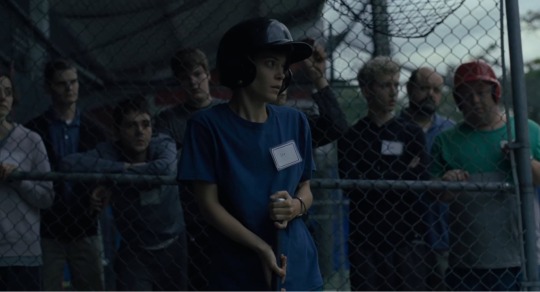
Turns out Emily Hinkler is a nonbinary actress. Lee (the character) is a cis guy who is conspicuously unmasculine. (If you've seen the movie - he's the one who gets hit in the head with a baseball). Casting a nonbinary actress as a cis boy at a conversion camp feels a bit off on it's own in that a conversion camp would be forcing people to adhere to assigned genders at birth. But I could get behind it as a sort of statement, like, a casting decision as direct opposition to the enforced gender binary of a conversion camp. i.e. Why should the movie adhere to the oppressive gender binary that the camp would? However, by casting a nonbinary actress as the least conventionally masculine character - it actually feels like it ends up reinforcing the binary. Lee's defining trait is that he's small and unmanly and, afaik, he's the only one of the male characters who is not portrayed by a cis man.
My issue with Xavier Dolan's casting is much simpler: Jon feels like he was written as a teenager and Xavier Dolan was approaching 30 when this was filmed. Maybe it wouldn't have bugged me so much if I didn't already know who Xavier Dolan was when watching the movie? Like, maybe if you watch it without knowing the actor's age, it works better? But also, the character feels like a teen but isn't explicitly stated to be a teen. So whenever he was on screen I kept wondering if actually part of Jon's situation is meant to be that he is 30 but stuck in a sort-of adolescence due to his relationship with his abusive father. Or did they just cast Xavier Dolan to portray a teenager?
This brings me to the third problem: Not enough of the ensemble. Jared, and thus the audience, spends proportionally, little screen time with the other people at the camp. They are rarely shown talking to each other - especially outside the restrictive observation of the camp's 'counselors.' This could be part of the point - i.e. that the camp is so isolating - but that isolation wasn't really highlighted by the camera/scenes/dialogue...so it really feels more like it's just an oversight. The movie focuses on Jared and his individual story and so the rest just fell by the wayside.
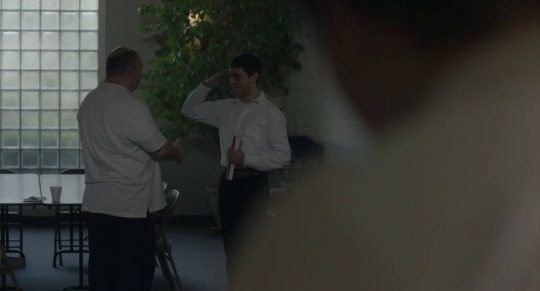
This is really unfortunate because there are some (potentially) great characters in there, especially Jon and Gary. Jon went through the program once before and is now back for a second time. We don't know what happened to make him come back. He appears to be 30-ish but he's staying at a hotel with his abusive father. He is completely invested in the program and treats his sexuality like an addiction. He has even taken it upon himself to forego all physical contact with other men (not even a handshake). His self-loathing is at once horrifying and heartbreaking.
In contrast, Gary (Troye Sivan) knows the entire program is bullshit, but he's playing along for his own survival. He's over 18; he lived with his boyfriend for a year prior to coming to the camp. So that begs the question of how his family convinced him to enter to the program. Also, Gary's so invested in his own survival, that he stays silent and is complacent in the abuse and violence he witnesses against others in the camp. He is both a victim and a bystander (at times).
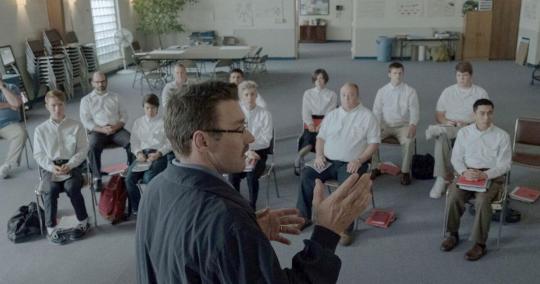
I think this film would've really benefited from spending more time with these characters (as well as Sarah, portrayed by Jesse LaTourette, and Cameron, portrayed by Britton Sear) in the camp and seeing how they all interacted with each other. Give us a sense of their different contexts and perspectives - and give us a better sense of the ways that conversion camps disempower the people sent there (even people like Gary, who knows it's bullshit). It's the thing that makes all the other movies about conversion camps work so well.
Which brings us to the fourth problem: the ending. If we spend more time with the ensemble, we'd either end up with a really long movie or we'd have to cut out something else. Well, folks, we can cut about 10 minutes off the end. Everything after the dinner Jared has with his mother post-escape can go. The climax of the film is when Jared finally decides to leave the camp. The resolution comes when his mother places herself in opposition to Jared's father (which she had never done before) and decides that she's going to take Jared home. And the emotional resolution comes when she admits to Jared that they made a mistake and that they harmed him by sending him to the camp.

Everything after that is extraneous. We don't really need to see Jared living in a city with a boyfriend, or see him begin to reconcile with his father. His relationship with his father was never the emotional core for the film. Boy Erased is, in some ways, a movie about self-actualization and that's the sort of movie that's best to end with something a bit open-ended. Y'know...a sort of end-that's-just-the-beginning kind of thing. Because the story of Jared falling in love and dating and moving out and gaining the self-confidence to confront his father - well that's a whole other movie. And here it gets shoved into the epilogue, which does the whole thing a real disservice.
Then there are the informational cards at the end. Two stick out as being particularly frustrating. One, "The real Victor Sykes left L.I.A. in 2008. He now lives in Texas, with his husband," feels irrelevant and unnecessary. The audience cares about what happened to Gerrard Conley (who wrote the story and whom Jared is based off of). But why do we care about what happened to the real guy who ran the camp? We don't...except for the jab about him now being married to a man - which feels like it's a more significant point for the cis straight people in the audience than for anyone queer. Turns-out-ex-gay-pastor-was-actually-just-gay-the-whole-time is not revelatory, I gotta say.
Then there's also this:

The emphasis about conversion therapy "practiced on minors," feels a bit disconnected from the film we just watched - which emphasized how abusive and traumatizing it is, even for adults. And in the U.S., all states currently legally allow conversion therapy for anyone 18+. Only Washington D.C. has banned it. And that, to me, is equally egregious, yet it isn't mentioned. The film itself challenges the notion that it's somehow okay for this to be practiced on adults because it's ostensibly their "choice," and then the info cards at the end shy away from that stance by focusing on kids.
I think the thing I find most frustrating about this movie, is the wasted potential. As I said at the beginning of this, there are some moments that really stand out in how they use the medium to convey meaning. There are some choices in how the film uses light and brightness (or lack thereof), that are pretty dang good, too. But ultimately, it's a film I feel so detached from and I think some of what I explained above is part of why.
#boy erased#lucas hedges#xavier dolan#emily hinkler#troye sivan#joel edgerton#nicole kidman#jesse latourette#britton sear
13 notes
·
View notes